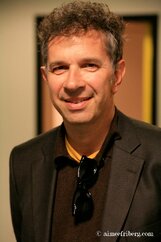|
Richard Blanco is author of several prize-wining books of poetry, City of a Hundred Fires; Directions to The Beach of the Dead; Looking for The Gulf Motel; Boundaries (2017), a collaboration with photographer Jacob Hessler; and this year How to Love a Country (Beacon Press 2019). President Barack Obama selected Blanco to serve as the fifth U.S. presidential inaugural poet, and he was the youngest and the first Latino, immigrant, gay person to fill that role. Blanco read “One Today,” an original poem he wrote for the occasion, at Obama’s inauguration ceremony on January 21, 2013. A children’s book, One Today, a collaboration with renowned illustrator Dav Pilkey, was released in 2015. In his first prose publication, For All of Us, One Today: An Inaugural Poet’s Journey (2013), Blanco shares the emotional experience of serving as presidential inaugural poet and reflects on what it means to be an American. His memoir, The Prince of Los Cocuyos: A Miami Childhood (2014), is a poignant, hilarious exploration of his coming-of-age as the child of Cuban immigrants and his attempts to understand his place in America while grappling with his burgeoning artistic and sexual identities. It received the 2015 Maine Literary Award for Memoir and the 2015 Lambda Literary Award for Gay Memoir.
Following the Boston Marathon bombings, Blanco wrote “Boston Strong,” a poem he performed at the TD Boston Garden Benefit Concert and at a Red Sox game at Fenway Park. He has written and performed for the re-opening of the U.S. embassy in Cuba, Freedom to Marry, the Tech Awards of Silicon Valley, and the Fragrance Awards at Lincoln Center. He has been featured on CBS Sunday Morning, NPR’s All Things Considered and Fresh Air with Terry Gross, as well as major media from around the world. Blanco’s poems and essays have appeared in numerous publications and anthologies, including the Best American Poetry series, The Nation, The New Republic, the Huffington Post, and Condé Nast Traveler. With Ruth Behar, he is co-creator of the blog Bridges to/from Cuba: Lifting the Emotional Embargo, which provides a cultural and artistic platform for sharing the stories of Cubans across the globe. 
Pablo Ortiz is a Professor of Composition at the University of California, Davis. His prizes and additional commissions include a Fromm in 1992, a Guggenheim Fellowship in 1993, and the Charles Ives Fellowship from the American Academy of Arts and Letters in 1996. In 1997 and 1998, Ortiz was commissioned two chamber operas, Parodia and Una voz en el viento, by the Centro Experimental Teatro Colon in Buenos Aires. In 1999 he was commissioned by the Koussevitzky Foundation to write a piece, Raya en el mar, for the San Francisco Contemporary Music Players. He received a grant in 2000 from Fideicomiso para la cultura Mexico-US to write children’s songs. In 2004 the Gerbode Foundation commissioned Oscuro, for Chanticleer and the San Francisco Contemporary Music Players. In 2008 he received an Academy Award from the American Academy of Arts and Letters. Recent premieres include Suomalainen tango, for orchestra, by the Orquestra Nacional de Catalunya, Trois tangos en marge by the Kovacik, Dann, Karttunen trio at the Museo Nacional Reina Sofia in Madrid, and Notker, for choir and organ, by Paul Hillier and the Theatre of Voices in Copenhagen. He worked with artist Eduardo Stupia on a multimedia oratorio for female voices, harp and percussion which premiered at the Centro Experimental Teatro Colon in Buenos Aires, in August 2012.
|
FEBRUARY 2019 TRACK OF THE MONTH
In honor of poet Richard Blanco's 50th birthday this month, here is:
"Leaving Limerick in the Rain" A TMF commission by Pablo Ortiz, a choral setting of Richard Blanco's TMF LiberArte poem. The score is a setting of the following two verses from Mr. Blanco's poem. "Leaving Limerick in the Rain" is performed by Coro Allegro in a recording made at its world premiere at Boston's Symphony Hall.
Next to me a bearded man in a cap sleeps, his brow, thick hands tell a story resting on the broken spine of a book facedown on his lap, parted to words he couldn’t finish—too droll or terrifying for him, perhaps. I wonder if his eyes are green as ferns or brown as dirt, if they are dreaming of tigers or moonlight echoes or the timbre of his father’s voice. I wonder if he’s leaving home or returning. Maybe he’s a stranger like me among strangers between points on the earth to which these tracks are nailed. Where I am, where I’m going, doesn’t matter. What matters is the poem in the window, a blurred watercolor where tree is chimney, chimney is cloud cloud is brick, brick is puddle, puddle is rain, and rain is me, refracted in each luscious bead. How impossible. How terrifyingly beautiful and free to be everything inside everything, never having to say I’m from here or there, never remembering my childhood home where I first played house, or the palm tree shadows down the street where I learned to ride bike, or my backyard with my father chasing fireflies caught like stars in a glass jar, or the room where I heard my voice first say, Richard, my name separating me from the world, the world suddenly fallen into geography, histories, weather, language, wars. RICHARD BLANCO Listen here to more music in our Track of the Month Series.
|

